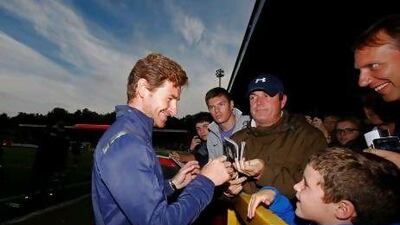A self-centred, tactically naive coach. One who lost his players' respect through a failure to communicate and angered his employer by sidelining expensively acquired signings? Yes, you can see why Tottenham Hotspur rid themselves of Harry Redknapp.
The process was not quite as Daniel Levy had hoped. A conviction for tax evasion would have allowed Tottenham's chairman to divest himself of Redknapp without a pay-off.
The English Football Association succumbing to rabid press demand that their favourite to succeed Fabio Capello as the England manager would have been better still, netting compensation for a man Levy considered a liability.
Ultimately a dismissal was required. Redknapp's repeated demands that his White Hart Lane contract be extended was rewarded with its termination.
His many media allies were outraged. How could Tottenham dismiss a manager who had delivered two top-four finishes in three years? Complaints intensified when it became clear that Redknapp's successor was to be Andre Villas-Boas, fresh from a brief, ugly spell at Chelsea.
Tellingly, there were far fewer moans from Tottenham supporters. The majority formed a frustrated group who had grown tired of Redknapp's self-contradictory, oft self-serving words and welcomed change.
Tottenham's players stayed remarkably quiet - if they were upset by the loss of a coach reputed to be one of the best man managers in the English game, most kept that discontent to themselves.
Redknapp's beheading, the anointment of Villas-Boas, was no hasty action. Levy had been looking for a new coach for the whole of last season. Extensive discussions were held with another casualty of Roman Abramovich's ire before Carlo Ancelotti received a more lucrative invite from Paris Saint-Germain; the position was also offered to Jose Mourinho as the Real Madrid manager looked to return to England.
Levy wanted a new coach for the modern era. Redknapp had been appointed in extremis - against significant personal reservations - when the club slumped into the relegation zone in 2008. His training and preparation methods, often not much more than 11v11 bounce games, were decades behind opponents', and his attempts to manipulate transfer policy through media briefings infuriating.
On the point of moving into a custom-built £45 million (Dh259m) training complex, working on the construction of a new stadium and attempting to ramp up Tottenham's commercial deals, Levy wanted his painstakingly assembled playing staff led by a coach from this century rather than last.
Villas-Boas had been tarnished by his eight traumatic months at Chelsea; the question was whether he had learnt from his errors.
It was common knowledge that Abramovich had sold Villas-Boas a dummy when extracting the Portuguese from Porto the previous summer. The project they had discussed was one in which Chelsea's ageing squad would be immediately overhauled; senior, high-paid, players moved on and replaced with younger men suited to the a Barcelona-inspired model both the owner and new coach admired.
Villas-Boas entered Chelsea in confrontational mode, steeling himself for the challenging task of informing the likes of Didier Drogba and Frank Lampard that they were no longer key performers.
Hard messages conveyed, but Abramovich stalled on the planned personnel changes, leaving Villas-Boas with a managerial migraine for which he never found an analgesic.
Still not 35, inexperience was part of the Villas-Boas problem, as was a belief that his prodigious tactical acumen could provide complete solutions to Chelsea's problems.
The Portuguese, though, is far from stupid. While continuing to collect his £2m post-tax Chelsea salary, Villas-Boas reflected on his errors and prepared for his next appointment.
He went on scouting trips to Germany, Spain and Brazil, took his family on holiday to the Maldives, made his annual trip to the Monaco Grand Prix, and spent a week and a half in an Algarve resort finalising his plans for Tottenham.
Privately, there were self-deprecating jokes about his poor man management. When Villas-Boas talked publicly about his new task, his words were carefully chosen.
"You always learn from experience," he said. "I've learnt a couple of things that I've maybe done wrong and I've learnt that in a club you have to trust the right people at the right time. And that's why I was always very meticulous on this next step.
"For me, after the Chelsea step, it was important to choose somewhere where I was surrounded with the right commitment and the right people, and I think I found it. I'm extremely privileged to be here.
"It's not on a mission of restoring my reputation, it's important to put Tottenham back with titles. Since 2008 we haven't won anything. Taking the club forward is mixing it with titles and success, and hopefully I can bring it to this football club."
His first weeks have been clouded by familiar concerns. Villas-Boas agreed with his chairman that Luka Modric should be sold to raise funds for a squad restructure, yet Levy then played his standard negotiating game. The asking price is £40m and Modric will not be sold until Real Madrid or some other suitor meets it.
The wait on Modric has prevented Villas-Boas from completing deals on the link midfielder, goalkeeper and at least one centre-forward he wants. Joao Moutinho is first-choice for the first, crucial, role, but Porto say they will not sell for less than €30m (Dh136m), so Spurs are pursuing Yann M'Vila of Rennes at less than half that price. Borussia Dortmund closed off Robert Lewandowski by asking for the same high sum, so Villas-Boas is working to conclude a deal for Internacional's Leandro Damiao instead.
For now there is frustration but, if the window closes close to plan, Villas-Boas will have the tools and the support to demonstrate those lessons learnt from Chelsea. The extended Redknapp family is looking forward to his failure. They may be disappointed once again.

